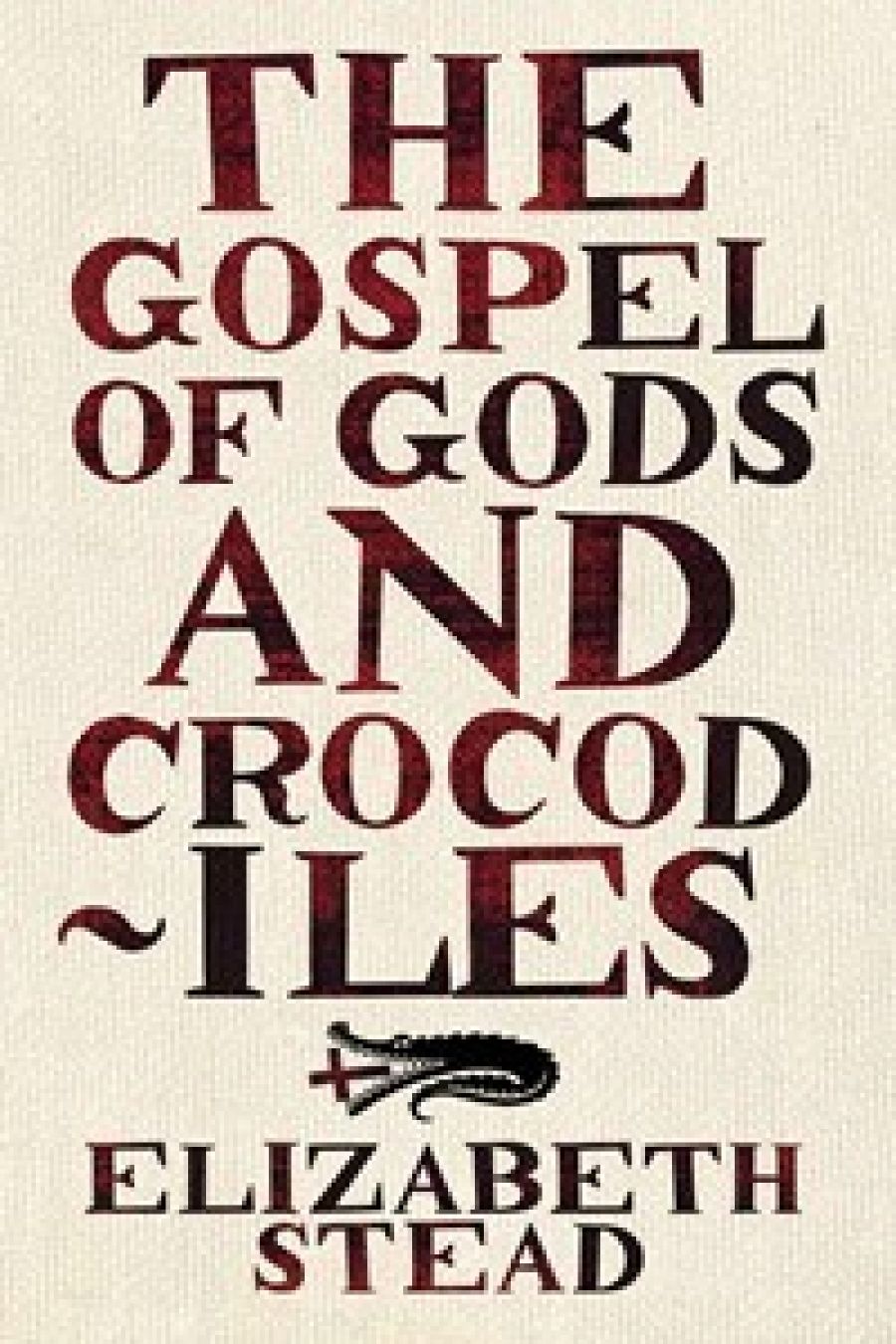
- Free Article: No
- Contents Category: Fiction
- Review Article: Yes
- Article Title: Wait and see
- Online Only: No
- Custom Highlight Text:
The Gospel of Gods And Crocodiles rewrites the boys’ own adventure tale of the nineteenth century. In an intertextual gesture, R.M. Ballantyne’s The Coral Island (1857) is the favourite book of one of Elizabeth Stead’s main characters. The thrill of conquest and the titillation of cannibal atrocities typical of Ballantyne’s imperialist fiction are thus replaced by a humanitarian concern with competing foundational myths and the clash of cultures. Stead’s narrative opens, like Genesis I, with the creation stories: the moon and crocodile legends of the unnamed coral island, situated ‘two degrees below the equator’. The arrival of white missionaries brings the attempt by the newcomers to overwrite this indigenous mythology with the Christian message. With this comes the inevitable introduction of Western ways.
- Book 1 Title: The Gospel of Gods and Crocodiles
- Book 1 Biblio: UQP, $32.95 pb, 301 pp, 9780702236020
Using comedy to leaven her serious critique of colonialism, Stead’s islanders observe, laugh at and mostly resist the ways of the white interlopers. Their attitude to the invaders is generally ‘wait and see’ and their perspective effectively estranges and exposes as absurd the imported practices – religious, social and economic – of the whites.
The first white man to arrive, Evan (nicknamed ‘Amen’ by the islanders) Morley, a naïve Seventh Day Adventist missionary, is questioned by the islanders about his rivals for the souls of the locals, the Catholics:
‘Is their God the same as yours?’
‘Yes and no …’ Amen said. ‘Well, not exactly. It’s difficult to explain in a simple way.’
‘We have been told that they talk to their god on a different day.’
‘Yes, their most holy day is Sunday. That is their day for something they call “Mass”, but they also have special prayers for when the sun is in the middle of the day and again when the sun slides into the sea.’
‘Why?’
‘The men from Detroit are what we call “Roman Catholics”.’
‘Then what are you?’
‘Mine is the church of the Seventh Day Adventist. We are Saturday. I am a pastor and they are priests, and they are Sunday.’ They were understandably still confused about the days of a white man’s week, but nodded to be polite and let the matter ride.
‘They have strange offerings on a white cloth. There is a man hanging on sticks and there is a picture of a fat white man.’ ‘The fat white man I expect is their Pope. He is the head of their church. The man on the cross will be the Lord Jesus, of course.’
As Stead’s plot unfolds, a white perspective emerges. The main characters are Sam Maitland, a holy innocent and failed carpenter from Australia who seeks adventure and who is befriended by the hapless but benign Amen Morley, his formidably pious wife, April, and the Welsh doctor, Herbert Glass. Eventually, along with several other white characters, they become locals themselves and immersed in the island community. The interchange of values and practices is fairly well handled. Stead mostly avoids the liberal Romantic trap of privileging every aspect of the indigenous culture over the imported. What she is seeking to value is hybridity. We see this in Sam’s (somewhat unlikely) transformation into a crocodile man of great stature in the village and in the character of Gemini, a local woman who learns much from Western culture but who is determined to retain what is precious in her island heritage. Gemini becomes a teacher of the island women and, because she has been severely damaged by it, she rejects white religion. Instead, she teaches what she believes to be useful: knowledge about health care, hygiene and the language of the white people. Reform of relations between the sexes is also necessary, and Gemini must tread a fine line between educating her students and avoiding giving offence to the patriarchal village elders.
This is a well-written and informative novel, rich in detail about the island’s flora and fauna, and respectful of indigenous practices and beliefs. Stead is conscious of the dangers of white ways imposed upon a once isolated population. Alcohol, prostitution, imported food (especially sugar products) and the destructive effects of industrialisation and the introduction of previously unknown diseases are the high price exacted by modernity.
While I was engaged and entertained by The Gospel of Gods and Crocodiles, it did not truly satisfy. Compared with, for example, Barbara Kingsolver’s The Poisonwood Bible (1998), about a white American Baptist missionary and his family who move to the Congo to deliver Western enlightenment just before the election and assassination of Patrice Lmumba, Stead’s book is curiously vague about political context and even about chronology. It is set in the postWorld War II era, but I was unsure for a long time about the decade of the novel’s action.
Another oddity is the imbalance of Stead’s critique of the Christian missionaries; while the Protestants are shown to be weak, ineffectual and largely irrelevant, Stead’s harshest criticism is of the Catholics, and this is unrelenting. This seems disproportionate: all the missionaries of whatever denomination are equally damaging in their different ways. This is a good novel but not a profound one; it is too soft-centred, and its resolution too easily accomplished.


Comments powered by CComment